#Off Grid Solar Inverter
Explore tagged Tumblr posts
Text
The Advantages of Using an Off-Grid Solar Inverter for Energy Independence
As the world shifts towards renewable energy sources, more individuals and businesses are seeking ways to gain energy independence. One of the most effective solutions for achieving this goal is by utilizing an off-grid solar inverter in conjunction with a solar energy system. Off-grid solar inverters play a crucial role in standalone solar setups, allowing users to generate and store their own electricity without relying on the traditional grid. In this blog, we’ll explore the key advantages of using an off-grid solar inverter for energy independence.
1. Complete Energy Independence
One of the most significant benefits of off-grid solar inverters is the ability to achieve complete energy independence. By generating and storing your own electricity, you are no longer reliant on the centralized power grid. This autonomy is particularly valuable for those living in remote or rural areas where access to reliable grid electricity may be limited or nonexistent.
Off-grid solar inverters empower users to harness solar energy for their everyday needs, from lighting and appliances to heating and cooling systems. This self-sufficiency allows individuals and businesses to manage their energy consumption without the constraints of grid availability or utility costs.
2. Cost Savings Over Time
While the initial investment in an off-grid solar system may be significant, the long-term financial benefits can be substantial. By producing your own electricity, you can significantly reduce or even eliminate your monthly utility bills. This is especially advantageous in areas where electricity rates are high or subject to frequent fluctuations.
Additionally, with an off-grid solar inverter, you can avoid the costs associated with grid maintenance and the potential for rate hikes in the future. Over time, the savings on energy bills can offset the installation costs, making off-grid solar a financially savvy investment.
3. Reliability During Outages
Power outages can be disruptive and inconvenient, especially for those dependent on electricity for daily operations. Off-grid solar inverters provide a reliable energy source that remains unaffected by grid failures. This is particularly important for homeowners living in areas prone to natural disasters or severe weather conditions.
With an off-grid solar system, your energy supply is secured, and you can continue to power essential appliances, medical equipment, and other critical systems without interruption. This reliability not only enhances comfort but also contributes to safety and peace of mind.
4. Environmental Sustainability
Switching to an off-grid solar system is a significant step towards reducing your carbon footprint. By harnessing renewable solar energy, you contribute to a cleaner and more sustainable environment. Off-grid solar inverters allow you to generate electricity without emitting harmful greenhouse gases, making it an eco-friendly alternative to fossil fuel-based energy sources.
Moreover, as global awareness of climate change increases, many individuals and businesses are motivated by a desire to make environmentally responsible choices. Utilizing off-grid solar inverters aligns with this commitment to sustainability and helps support a greener future.
5. Flexible System Design
Off-grid solar systems offer incredible flexibility in design and installation. Unlike grid-tied systems, which must conform to existing electrical infrastructure, off-grid setups can be customized to meet specific energy needs. This means you can choose the size of your solar array, battery storage capacity, and inverter specifications based on your energy consumption patterns.
Whether you need a small system for a remote cabin or a larger setup for a homestead, off-grid solar inverters can be tailored to suit your unique requirements. This adaptability ensures that you have a reliable energy solution that meets your needs now and into the future.
6. Resilience to Energy Price Fluctuations
Energy prices can be unpredictable, with utility companies often increasing rates without warning. By using an off-grid solar inverter, you protect yourself from these fluctuations. Your energy costs become predictable, as you are generating your own electricity from sunlight.
This resilience against price increases not only offers financial stability but also allows for better budgeting and planning. Knowing that your energy costs are under your control enables you to allocate resources more effectively.
7. Promotion of Energy Innovation
Choosing an off-grid solar inverter encourages the adoption of innovative technologies. As the demand for renewable energy solutions grows, advancements in solar technology, battery storage, and inverter efficiency are continually emerging. By investing in off-grid systems, you contribute to this trend and support the development of new and improved technologies.
Innovative solutions, such as smart monitoring systems and energy management software, can be integrated into off-grid setups, allowing users to optimize their energy consumption and maximize the benefits of their solar systems.
Conclusion
The advantages of using an off-grid solar inverter for energy independence are compelling. From achieving self-sufficiency and reliability to reaping long-term financial savings and promoting sustainability, off-grid solar systems offer a range of benefits that resonate with individuals and businesses alike.
As technology continues to advance and the push for renewable energy grows, off-grid solar solutions are becoming increasingly viable and attractive. Whether you live in a remote area or simply want to reduce your dependence on traditional energy sources, investing in an off-grid solar inverter can pave the way to a more independent, sustainable, and financially secure future. Embrace the power of the sun and take control of your energy needs with an off-grid solar system today!
0 notes
Text
Why Purchase Quality Battery Charger Inverter for Your Solar Panel
A high-quality battery charger inverter enhances your solar panel system by proficiently converting and managing power. It ensures ideal energy conversion from solar panels to AC power, supports higher power outputs, and provides a compelling battery. Robust construction offers solidness and dependable execution, improving your solar energy setup's general efficiency and lifespan. Investing in a quality battery charger inverter maximizes energy use, reduces energy loss, and ensures consistent power conveyance. It thus makes it a significant part of a well-functioning solar power system.

0 notes
Text
#off-grid solar inverters#off-grid solar inverter#best off-grid solar inverters#best off-grid solar inverter#off-grid inverters#off-grid inverter#best off-grid inverters#off grid solar inverters#off grid solar inverter#off grid inverters#off grid inverter#pvblink off grid inverter#off grid inverter blog
0 notes
Text
Which on-grid or off-grid solar Inverter is best for your home?
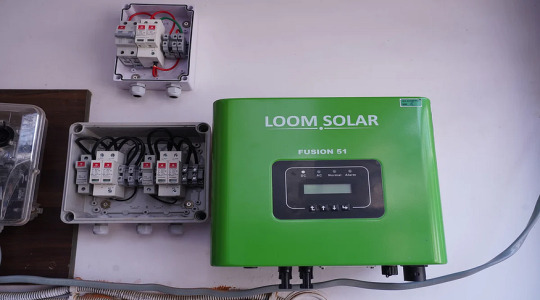
On-Grid solar system:
Advantages:
Cost-Effective: On-grid systems typically save money because they don’t need to store expensive batteries.
Lower Starting Venture: It is possible to begin with a smaller solar installation and gradually increase it.
Energy Credits: For credits or compensation, surplus electricity can be fed back into the grid.
Minimal Maintenance: Simpler maintenance results from fewer components.
Considerations:
Grid Reliance: You depend on the network during overcast days or around evening time.
Power Outage: On-grid systems do not provide backup power during grid outages.
Limited Energy Independence: In terms of energy, you are not entirely self-sufficient.
youtube
Off-Grid solar system:
Advantages:
Independence on Energy: Power is maintained during power outages by off-grid systems, which operate independently of the grid.
Reasonable for Distant Areas: Ideal for areas without admittance to the utility framework.
Environmental Benefits: Diminished dependence on non-renewable energy sources.
Considerations:
Higher Beginning Expense: In the beginning, off-grid systems are more expensive because they need to store batteries.
Maintenance: Batteries require support and inevitable substitution.
Sizing Problem: This should be painstakingly estimated to fulfill energy needs all year.
Waste of potential energy: During seasons of excess, abundance energy might be squandered in the event that not put away effectively.
In summary, the choice between on-grid and off-grid solar inverter depends on your specific circumstances. On-grid solar inverter are typically more cost-effective and suitable for areas with reliable grid access. Off-grid systems are for those seeking complete energy independence but come with higher upfront costs and maintenance considerations. A hybrid system can offer a balance between the two, providing backup power without the full cost of an off-grid setup. Consulting with a solar professional is advisable to determine the best fit for your home.
0 notes
Text
Is A Solar Inverter Useful for Home Purposes?
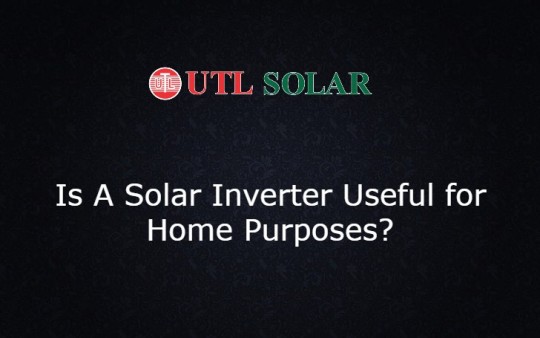
A solar inverter is a device that converts the direct current (DC) electricity generated by your solar panels into alternating current (AC) electricity, which is the form of electricity that is used in your home for powering appliances and electronics.
In that sense, a solar inverter is a crucial component for any solar power system, whether it’s for residential or commercial purposes. The inverter is responsible for ensuring that the electricity generated by your solar panels is suitable for use in your home, and it also performs other important functions such as monitoring the output of your solar panels, and optimizing the performance of your system.
Having a solar inverter for your home has many benefits. Firstly, it allows you to generate your own electricity, which can reduce your reliance on the traditional power grid and lower your monthly energy bills. Solar power is also a clean and renewable energy source, which means that it won’t contribute to environmental problems like greenhouse gas emissions.
Moreover, modern solar inverters are designed to be highly efficient, meaning that they can convert a high percentage of the energy generated by your solar panels into usable electricity. This can maximize the amount of energy that you can produce, and also improve the overall performance of your system.
Conclusion
A solar inverter is an essential component for any home solar power system, and it offers many benefits, including reduced energy bills, increased energy efficiency, and a more sustainable and environmentally-friendly source of electricity. So, if you’re considering switching to solar power for your home, be sure to invest in a high-quality solar inverter that meets your specific needs and requirements.
#solar inverter#solar inverters#hybrid solar inverter#off grid solar inverter#solar inverter battery#gamma plus solar inverter#Gamma Plus MPPT Solar Inverter#shamsi solar inverter
0 notes
Text
What Is The Use Of Off Grid Three Phase Inverter?

Solar inverter is the core component of the solar system, and its main function is to convert direct current(DC) into alternating current(AC). In the number of phases output by the inverter, it can be divided into single-phase inverter and three-phase inverter. For factories, enterprises and other commercial use of electrical appliances are mostly three-phase high power loads, usually choose three-phase inverter. Let's learn more about the role of off-grid three phase inverters. The three-phase inverter converts the DC to three-phase AC. At this point, the three-phase power can carry three-phase loads. The three-phase inverter can not only support 100% imbalance loading, but also carry single-phase loads for home users. Each phase of the three-phase power supply and its neutral point can form a single-phase circuit to provide power for single-phase loads commonly used in the home, such as washing machines, televisions and other appliances. Our HDSX three-phase inverter is providing stable and reliable solutions for home , industrial and commercial applications. It not only supports three-phase unbalanced load, 3 times peak power, pure sine wave output, but also supports setting different working modes based on variable usage requirements. With complete output protection, you can use it with peace of mind. This could be the three-phase inverter solution you’ve been looking for! Get in touch with Xindun now to learn more.
#three phase inverter#off grid inverter#off grid three phase inverter#solar inverter#single phase inverter
0 notes
Text
Why Choose Luminous Solar Inverters? An Expert’s Guide to Their Benefits
Welcome to today’s podcast! We’re excited to explore the benefits of selecting Luminous Solar Inverters in your sun power gadget I’m your host, and nowadays, we’ll explore why those inverters are a top desire for plenty. To know more information visit us at: https://www.lotusbatterywala.com/
0 notes
Text
Hybrid Inverters: Integrating Solar Power and Battery Storage
A hybrid inverter is a multifunctional device that combines a solar inverter and a battery inverter into one system. It converts DC electricity from solar panels into AC electricity for use in homes and businesses while managing the charging and discharging of battery storage. Hybrid inverters allow users to store excess solar energy for later use, optimize energy consumption, and reduce reliance on the grid. They provide energy independence by enabling seamless integration between solar panels, battery storage, and the grid, making them ideal for both residential and commercial applications aiming for efficiency and sustainability.

#hybrid inverter#solar energy#battery storage#DC to AC Conversion#energy management#Grid Connection#energy independence#renewable energy#smart technology#Off-Grid Systems#solar power system#energy efficiency#backup power
0 notes
Text
High-Quality Solar Off-Grid Inverter - Green Spectrum Solutions
Explore top-notch Solar Off-Grid Inverter at Green Spectrum Solutions. Our advanced inverters ensure reliable energy conversion, maximizing efficiency for your off-grid solar systems. Perfect for remote locations, our inverters provide dependable power solutions tailored to your specific needs.
0 notes
Text
How to Use Off Grid Solar Inverter Without Battery
Introduction
In the quest for sustainable energy solutions, off-grid solar inverters have emerged as a pivotal technology, enabling users to harness solar power even in remote locations. Traditionally, these systems rely heavily on batteries to store energy for use during non-sunny periods. However, advancements in technology and innovative configurations have paved the way for utilizing off-grid solar inverters without batteries. This article explores the methods, benefits, and considerations of using off-grid solar inverters without batteries.
Understanding Off-Grid Solar Inverters
Off-grid solar inverters are devices that convert the direct current (DC) generated by solar panels into alternating current (AC) suitable for household or commercial use. Unlike grid-tied inverters, which work in conjunction with the utility grid, off-grid inverters operate independently, providing a self-sustaining power solution.
Why Consider Using Off-Grid Solar Inverters Without Batteries?
Using off-grid solar inverters without batteries can offer several advantages:
Cost Savings: Eliminating batteries reduces the initial setup and maintenance costs significantly.
Simplified System: Without the need for battery management systems, the overall configuration is less complex.
Immediate Usage: Energy is used as it is generated, minimizing energy loss and improving efficiency.
Methods to Use Off-Grid Solar Inverters Without Batteries
1. Direct DC Load Connection
One of the simplest methods to use an off-grid solar inverter without batteries is by directly connecting the DC loads to the solar panels through the inverter. This setup is straightforward and cost-effective, but it requires that the solar energy produced matches the immediate power needs.
2. Grid-Assisted Systems
In a grid-assisted system, the off-grid inverter is connected to the utility grid, which acts as a backup source. When solar power is insufficient, the system seamlessly switches to grid power. This hybrid approach ensures a continuous power supply without the need for batteries.
3. Solar Water Pumping Systems
Solar water pumping systems are a prime example of battery-less operation. These systems use solar power directly to pump water, typically for agricultural purposes. The inverter ensures that the pumps operate efficiently without the need for energy storage.
4. Advanced Power Management Systems
Advanced power management systems can intelligently control the distribution of solar power to various loads. These systems can prioritize essential loads and manage excess energy, ensuring optimal utilization without relying on batteries.
Key Considerations for Battery-Less Off-Grid Solar Inverter Systems
1. Energy Consumption Patterns
Understanding the energy consumption patterns is crucial for designing an effective battery-less system. It is essential to ensure that the solar generation capacity aligns with the peak energy demands.
2. Weather and Solar Availability
Since battery-less systems cannot store energy, they are highly dependent on solar availability. Regions with consistent sunlight are ideal for such configurations. Monitoring weather patterns and adjusting usage accordingly can mitigate power shortages.
3. Inverter Sizing and Efficiency
Choosing the right inverter size is critical. The inverter must handle the maximum load requirements and operate efficiently under varying solar conditions. High-efficiency inverters can maximize energy utilization.
4. Load Prioritization and Management
Implementing a load prioritization strategy can enhance system reliability. Critical loads such as lighting and communication equipment should receive priority, while non-essential loads can be powered down during low solar production periods.
Benefits of Battery-Less Off-Grid Solar Systems
1. Reduced Environmental Impact
By eliminating batteries, the environmental impact associated with battery production, disposal, and recycling is significantly reduced. This makes the system more eco-friendly.
2. Lower Maintenance Requirements
Battery-less systems require less maintenance as there are no batteries to monitor, replace, or manage. This simplifies the upkeep and reduces long-term operational costs.
3. Enhanced System Lifespan
Without the wear and tear associated with battery cycles, the overall lifespan of the solar power system can be extended. Inverters and solar panels tend to have longer operational lifespans compared to batteries.
4. Immediate Energy Utilization
Energy generated by the solar panels is immediately used, reducing losses associated with energy storage and retrieval. This direct utilization can improve overall system efficiency.
Challenges of Battery-Less Off-Grid Solar Systems
1. Reliability and Consistency
The primary challenge of battery-less systems is ensuring a consistent power supply, especially during periods of low solar production. Implementing supplementary power sources or adjusting load patterns is essential.
2. Limited Backup Power
Without batteries, there is no backup power during nighttime or cloudy days. This limitation requires careful planning and potentially integrating auxiliary power sources like generators.
3. Dependence on Solar Availability
Battery-less systems are heavily reliant on solar availability. In regions with variable sunlight, this dependence can lead to power shortages unless additional measures are implemented.
Applications of Battery-Less Off-Grid Solar Inverter Systems
1. Agricultural Water Pumping
Solar water pumping systems for irrigation are a practical application, providing a sustainable water supply for agricultural activities without the need for batteries.
2. Remote Telecommunication Stations
Telecommunication stations in remote areas can benefit from battery-less solar systems, ensuring reliable power for communication equipment and reducing operational costs.
3. Rural Electrification Projects
Battery-less solar systems can be utilized in rural electrification projects, providing power to remote communities and improving living standards without the complexity of battery management.
4. Commercial and Industrial Use
Certain commercial and industrial applications with consistent daylight operational hours can leverage battery-less solar systems for cost-effective energy solutions.
Future Prospects and Innovations
The future of battery-less off-grid solar systems is promising, with ongoing innovations aimed at improving efficiency and reliability. Technological advancements in inverter design, power management, and solar panel efficiency will continue to enhance the viability of these systems.
Conclusion
Using off-grid solar inverters without batteries presents a cost-effective, efficient, and sustainable energy solution for various applications. While there are challenges to address, the benefits of reduced environmental impact, lower maintenance, and immediate energy utilization make it an attractive option. By understanding energy consumption patterns, optimizing system design, and implementing advanced power management, battery-less off-grid solar systems can provide reliable power in diverse settings.
#Off grid solar inverter#Off grid solar inverter without Battery#best solar inverter in india#solar inverter
0 notes
Text
Benefits of a Battery Charger Inverter for Your Home
A battery charger inverter for your home offers key advantages: it works as a combination of energy storage and solar power with backup during blackouts, the excess solar power is utilized by storing it, and it makes a household or home more independent of energy suppliers. It also optimizes energy usage and the battery charging system to lengthen the lifespan.

#battery charger inverter#off grid inverter#off grid solar inverter#solar charger inverter#sungoldpower inverter#home power inverter
0 notes
Text
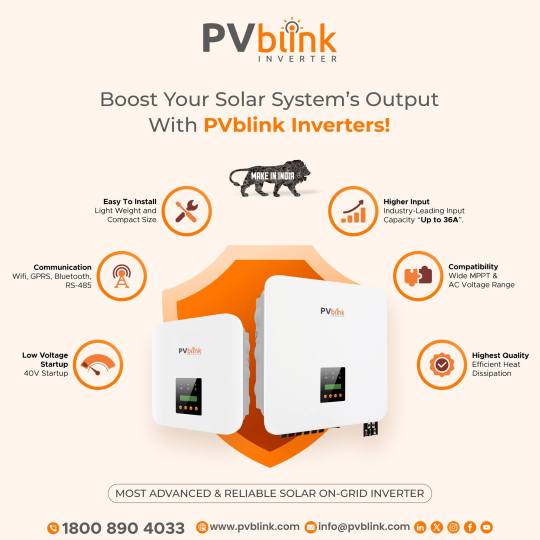
Most Advanced & Reliable PVblink Solar Inverters
Maximize Your Solar Power Potential with PVblink Inverters! Boost your system's output and harness every ray of sunshine with our cutting-edge technology.
For more info: 1800 890 4033 | [email protected] | https://www.pvblink.com/
0 notes
Text
Madathil Enterprises | Solar Panel Installation in Kerala | 97 45 45 1234
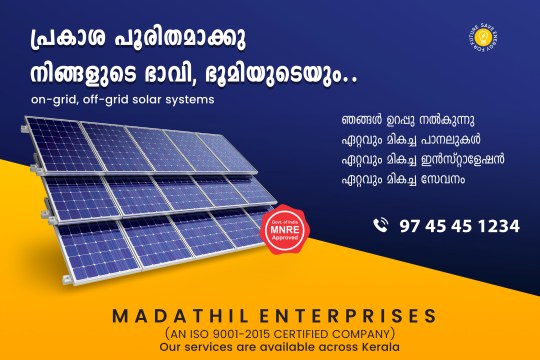
Illuminating Kerala's Skyline: Madathil Enterprises' Commitment to Solar Excellence
In the sun-kissed state of Kerala, where the lush green landscape meets the azure skies, there exists a beacon of sustainable progress – Madathil Enterprises. With a steadfast dedication to quality and innovation, this ISO 9001-2015 certified company has been illuminating rooftops across the region with their exceptional solar panel installation services.
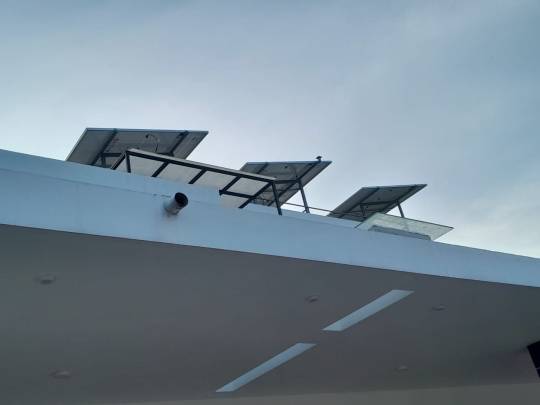
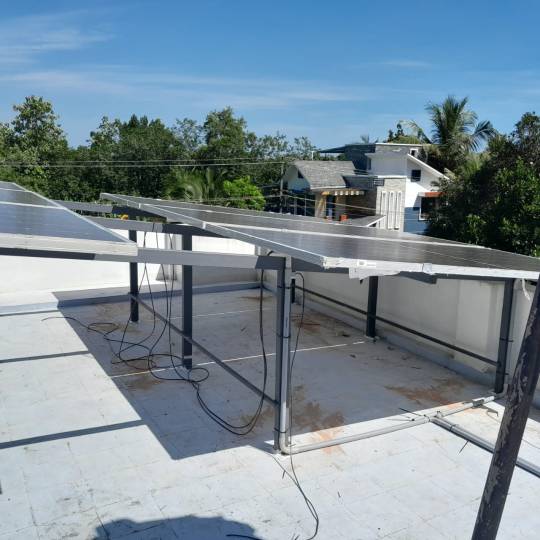
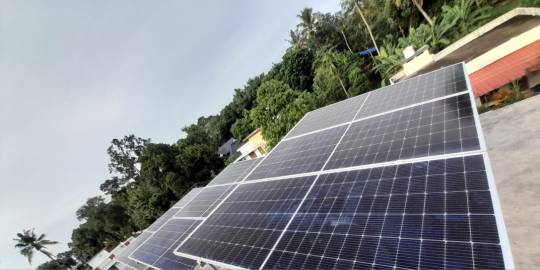
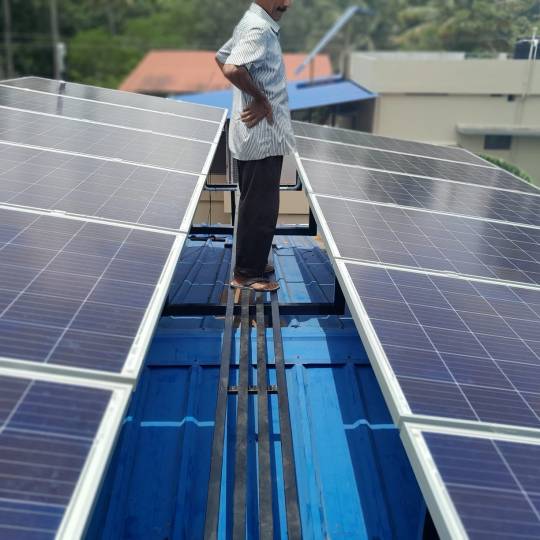
Madathil Enterprises is not just another solar solutions provider; it's a testament to expertise, reliability, and a passion for a greener tomorrow. Specializing in rooftop solar installations for both domestic and industrial clients, the company boasts an impressive portfolio of over 3000 projects spanning 24 years.
What sets Madathil apart is their unwavering commitment to quality. Partnering with major brands like V-Guard, UTI Solar, Vikram Solar, Adani, Waare, and more, they ensure that every installation is equipped with the finest materials and accessories. This dedication to excellence has earned them the status of an MNRE approved vendor, a badge of honor in the renewable energy industry.
But Madathil Enterprises isn't just about installing solar panels; it's about empowering communities and businesses to embrace sustainable energy solutions. They offer both on-grid and off-grid systems, providing tailored solutions to meet the unique needs of each client. Whether it's reducing carbon footprints, cutting energy costs, or ensuring energy independence, Madathil Enterprises delivers results that go beyond expectations.
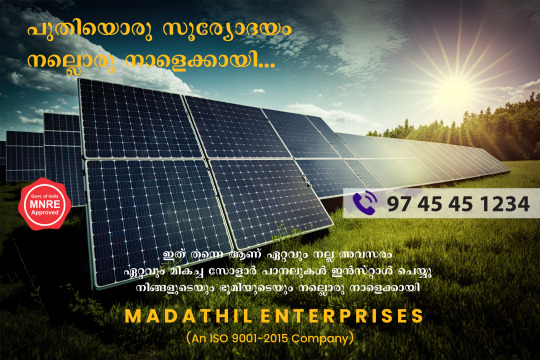
As Kerala continues to embrace the promise of solar energy, Madathil Enterprises stands as a guiding light, leading the charge towards a brighter, cleaner future. With their unparalleled expertise, unwavering quality, and commitment to sustainability, they are not just shaping the skyline; they're shaping a better tomorrow for generations to come. Join them on their journey towards a sun-powered future, and together, let's paint Kerala's skyline with the colors of sustainability.
#solar#solar panel#inverter#solar power#solar water heater#madathil enterprises#solar panel kerala#rooftop solar kerala#solar subsidy kerala#kollam#alappuzha#kottayam#thiruvananthapuram#thrissur#ernakulam#kochi#karunagappally#sustainable energy#go green#v-guard solar#v guard solar dealers kerala#waarre solar#utl solar#vikram solar#adani#kerala solar#solar energy solutions#off-grid#on-grid#solar power plants
1 note
·
View note
Text
Sunpower Nerang Inverters - Why Are They Important?
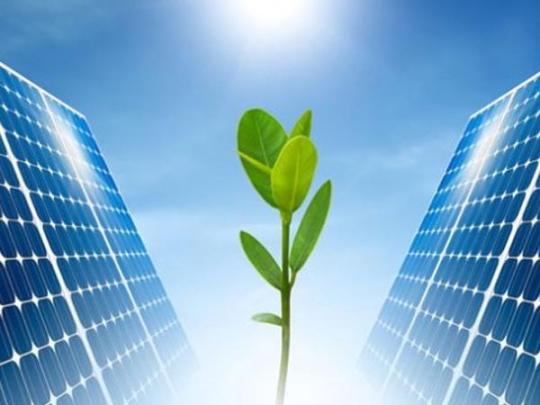
Sunpower Nerang is an intelligent way to reduce your energy bills and contribute to a cleaner environment. It’s also an affordable and reliable alternative to rising electricity prices.
An inverter converts DC solar power into alternating current for household use. Most residential solar systems use string inverters. They are cheap and easy to install. They are also easier to repair and maintain than microinverters. To know more about Solar Inverters, visit the Sun Solar Australia website or call 1800931992.
Inverters are a major part of any solar energy system. They convert DC power from solar panels into AC power that can be used in a home. They also perform other grid-management functions, such as adjusting their power output to match other supply and demand on the electricity grid. These features are important because they can help ensure that your solar panel system generates the most money in the long run.
A solar inverter’s cost depends on its type, size and efficiency. While it is tempting to buy the cheapest inverter, you should also consider its durability and quality. A good quality inverter may cost more upfront, but it will save you money in the long run.
The most common type of solar inverter is a string inverter. It connects a set of solar panels in a row to a single inverter, and transforms the power produced by all the panels into AC. This design is simple to install and wire and has fewer components that can break down. However, it can’t discern which panel is producing power, so if one panel is shaded or contaminated, the whole string produces less power.
Among other functions, solar inverters convert DC energy from your solar panels into AC power to be used in homes or fed back to the grid. In order to maximize your solar energy production, you need an inverter that is efficient.
Inverter efficiency is important for several reasons. First, it determines how long it will take for your system to pay back its initial investment through electricity savings. Second, it plays a critical role in the performance and reliability of your solar-plus-battery storage system.
It is also crucial to choose the right inverter size for your system. Oversizing an inverter can help prepare for future system expansions, while undersizing (within regulatory limits) allows for more efficient operation during low light conditions. However, it may risk power clipping during peak sun hours.
You should also check the inverter’s CEC or European efficiency rating. This information can be found on the manufacturer’s website or by using a free online tool like this one.
A quality solar power system is backed by a manufacturer warranty that lasts for up to 25 years. In addition, reputable installers offer warranties for the installation process and monitoring software. Depending on the type of system you choose, you may also get a warranty for the solar batteries and inverters.
Solar inverters are vital components of solar energy systems. They transform DC input from multiple solar panels into alternating current (AC) output for your home. They’re available in two different types: string inverters and microinverters. String inverters are a more economical choice and work best for solar arrays without battery storage. Microinverters are smaller and connect to each individual solar panel, transforming DC input into AC output at the source.
SolarEdge and Enphase offer warranties that last up to 25 years, but their terms differ a lot from one manufacturer to another. To make a claim, you must provide proof of purchase and a description of the issue.
A solar inverter converts DC power from your solar panels into AC current that can be used in your home. It also allows you to sell electricity back to the grid. Inverters are the heart of a solar energy system, and it is crucial to choose one that has a high-quality brand and good reputation.
Solar energy is a sustainable and renewable energy source that can save you money on your energy bills. In addition, a solar power system can improve your property’s resale value and reduce the amount of carbon you produce. It is also a great way to protect yourself from rising utility rates. To know more about Solar Inverters, visit the Sun Solar Australia website or call 1800931992.
Solar inverters require regular maintenance and cleaning to keep them working well. They should be kept away from flammable materials and gases, and should be in a ventilated space. This will ensure that the batteries do not short circuit and cause fire accidents. Additionally, it will help them maintain their maximum lifespan.
#hybrid solar system#hybrid solar system nerang#solar installation brisbane#residential solar panels#commercial solar#solar panel#solar installation#off grid solar nerang#solar energy system company#solar panel brisbane#Home Solar Electric System#solar inverters#solar energy system company Nerang#Solar Installation
0 notes
Text
Shop the Best Off Grid Solar Inverter for Your Needs!
Upgrade to sustainable power with SunGarner's Best off grid solar inverter. Harness solar energy efficiently and reliably, even in remote areas. Explore our range for cutting-edge technology, durability, and affordability. Power up your off-grid lifestyle with SunGarner today!
0 notes